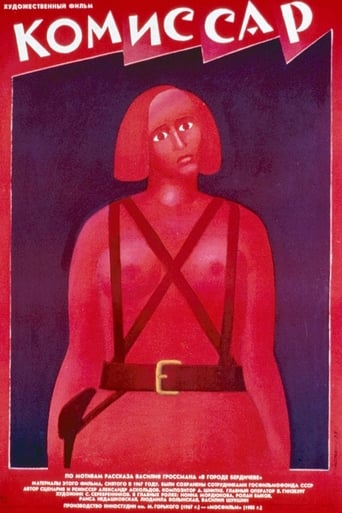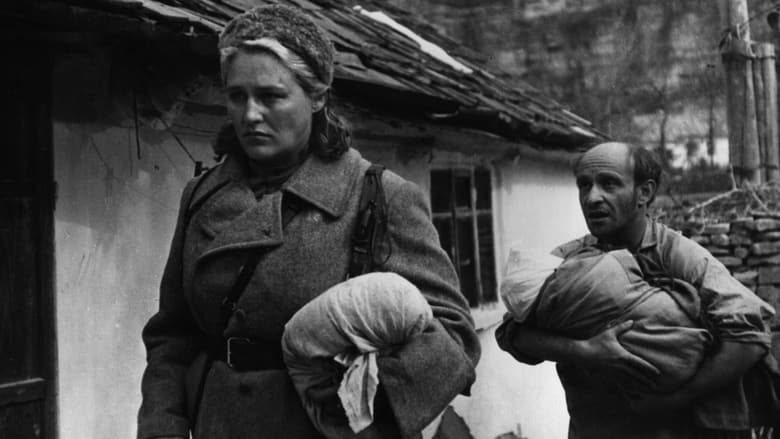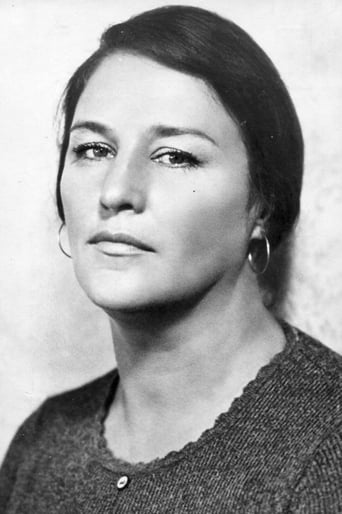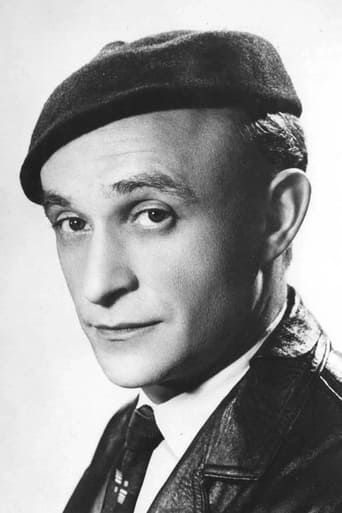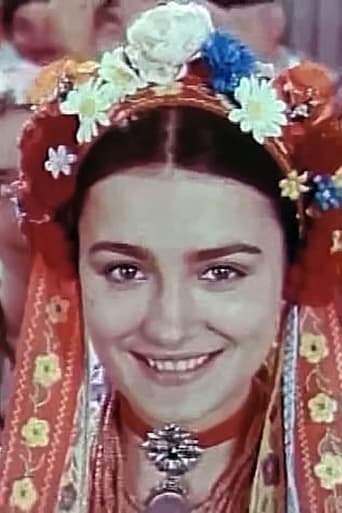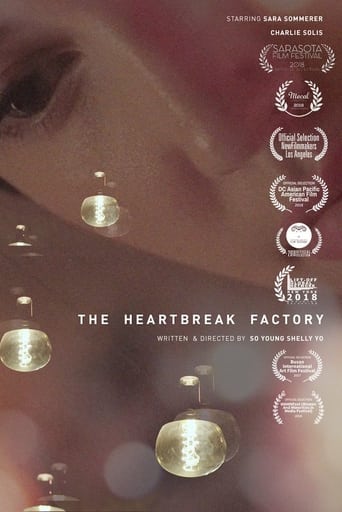The Commissar (1967)
Klavdia Vavilova, a Red Army cavalry commissar, is waylaid by an unexpected pregnancy. She stays with a Jewish family to give birth and is softened somewhat by the experience of family life.
Watch Trailer
Free Trial Channels
Cast


Similar titles
Reviews
It’s an especially fun movie from a director and cast who are clearly having a good time allowing themselves to let loose.
Blending excellent reporting and strong storytelling, this is a disturbing film truly stranger than fiction
While it doesn't offer any answers, it both thrills and makes you think.
I enjoyed watching this film and would recommend other to give it a try , (as I am) but this movie, although enjoyable to watch due to the better than average acting fails to add anything new to its storyline that is all too familiar to these types of movies.
Many elements in this film are about getting closer to the story, and the characters. One of the earliest indications of this intent is the camera- it is very lively throughout the film, and one of the repeating motifs is of it coming closer to scene- first physically but then much closer than even that. The camera moves like a person in the scene, only one unafraid of proximity, and very early on we can even see the camera take the viewpoint of a character being pushed inside a building; but strangely that's still the second closest it comes to a character.During the childbirth scene in this movie, the camera is able to enter a metaphysical place as a metaphor for the main characters current experience- scenes of soldiers and horses. But the movie is just as much about the reality that was used as a metaphor as it was about the 'actual' events.The scope of the plot is incredibly small as it follows a single family and Klavdia over a few days. but through this very small scope the movie speaks about something much more- about the treatment of Jews, about war, and about the revolution.This movie gets very close to a few characters and creates an emotional bond between them and the audience. In a word, this movie is very human, creating scenes that are very warm and others that are very sad. And through these few character and events is capable of talking about much more.
Commissar directed by Aleksandr Askoldov is a 1967 Soviet film based on one of Vasily Grossman's short stories. The story is set during the Russian Civil War and centers around a female commissar of the Red Army cavalry, Vavilova, who is introduced to the audience as a brutal soldier shooting a deserter with zero remorse. The audience clearly sees her inhumane nature when she finds herself pregnant and mentions how she would have gotten rid of "it" if only she had known earlier. Finding herself pregnant and due to deliver her baby any day she is forced to stay with a not so well off Jewish family who is at the beginning is reluctant to accept her staying with them. Through her time with this family her character makes a drastic change as she now embraces motherhood, and life as a woman. One of the many themes in this film is the effect war has had on adults and children alike. The husband, who is exhausted from constantly working while earning very little, but has to feed seven children. The wife, who has to do all the house chores. In one scene the children aggressively bully and begin to wage a mock pogrom on their older sister by tying her to a swing and swaying her back and forth. The action could have only been possible by observing the actions of soldiers. Although the family is caught in all this chaos Askoldov manages to capture the warm nature of family life through the slow panning of the children and their parents sleeping as well as them dancing together. Askoldov finds ways to dramatize particular scenes; one noticeable moment is the scene of Vavilova struggling during her delivery, which is paralleled with a scene of a group of soldiers struggling to push a wagon. Also the scene where the soldiers are drinking water after succeeding to push the wagon and the scene where Vavilova drinks water when she succeeds in giving birth. This film did not adhere to the honorable vision of Soviet life in war along with the aftermath that the party officials desired the world to see. The audience is made aware of the Soviet Unions role in the holocaust, which is captured in a striking dream sequence near the end of the film where the Jewish family is happily dancing and the moment is cut short as we see the family wearing stars walking with other Jews to what seems to be a concentration camp.
I was surprised to hear that "Komissar" was filmed in 1967, a year when the USSR was already firmly past Kruschev's thaw and entering the repressive Brezhnev era, because there is something very "thawish" about this film. The general criticism of war, the dignity of ordinary people during a time of calamities, and the juxtaposition of battles with moments of civilian life, all hearken back to the ideas expressed in "The Cranes are Flying" (1956). As in all Soviet cinema, many of the central ideas are expressed through symbolism. This makes the film somewhat difficult for viewers who are not used to this style, but most people tend to find it refreshing and psychologically stimulating. It certainly prompts more post-film discussions than current American cinema that simply shoves the director's point of view down the audience's throat.Some of the themes that I found particularly interesting were: the use of the innocence of children to depict the horror of war, the image of saddled horses without riders galloping into battle, and, of course, the father dancing in the midst of a bomb raid. Most of all, I thought that the change in Vavilova - going from a rough, battle hardened Red Army officer to a nurturing mother, is the most poignant aspect of this film. The scene where Vavilova is hunted my soldiers for having a child mimics her own persecution of a man who leaves the army to be with his beloved. The soldiers turn out to be figments of her imagination, but the point is obvious. However, Vavilova's decision in the end of the film (which I will not reveal for fear of getting blacklisted by the IMDb NKVD) is puzzling in light of the changes in her character. I suppose that Askoldov's opinion that a person's nature cannot be changed by one experience is contrary to my own optimism. Still, I find the end to be somewhat unrealistic.
The Komissar is successful because it is thought provoking and evokes emotion from the viewer. Interestingly, although this film deals with a Jewish family and various issues of Judaism, the careful observer notices that the film is also full of symbols of Christianity. In fact, there are so many of these examples that it leads the viewer to wonder whether the filmmaker may have intended to make a commentary on the relationship between Judaism and Christianity. Although modern Christianity and Judaism are quite different from each other, they have very similar backgrounds. Indeed, prior to the birth of Jesus, they were both one religion, and became separate because Jews refused to accept Jesus as the Messiah, while Christians believed that his life was the fulfillment of Old Testament prophecy.Some of the Christian symbols in the film are less conspicuous than others, and blend into the film seamlessly. For example, there are several scenes in the film that show crosses in the background. At one point the camera focuses on a cemetery that is filled with crosses. There are also crosses on top of churches in many scenes. The connection between Judaism and Christianity is apparent in the fact that in one scene the focus shifts back and forth between a Jewish synagogue and a Christian church, which are both being boarded up.The beginning of the film is marked by the perspective of the two female characters, Klavdia and Maria, regarding pregnancy and childbirth. It is significant that Klavdia was an important military figure, but was forced to give up her command because she was pregnant; this would obviously never happen to a man. Although Maria has six children, she talks openly with Klavdia about the pain of childbirth, stating that it "is not good for the mother, the child, or God." The scene where Klavdia gives birth further emphasizes the pain of childbirth. In both Jewish and Christian history, the pain of childbirth is a consequence that God gave to women in response to Eve's decision to tempt Adam with the forbidden fruit in the Garden of Eden.There is one scene in the film that is particularly touching because it reveals the depth of the relationship between Yefim and Maria, who do not show such blatant affection at any other point in the film. This is the scene where Yefim washes Maria's feet. As he does so, he looks up lovingly into her eyes, and says, "I love you." This scene is both tender, and also a little shocking because throughout the rest of the film Yefim is portrayed as brusque and a little rough around the edges. This is the one time in the film when the viewer is allowed to see through his exterior. It is interesting that the filmmaker chose to use the washing of feet as the interaction between the two characters during this personal moment. The washing of feet is a symbol that relates directly back to Christianity and the Bible, bringing to mind Christ washing his disciples' feet before he was crucified.The film ends with Klavdia's decision to leave her baby with Yefim and Maria. This seems ironic because their relationship did not start out well Yefim was outraged that Klavdia was taking a room in their house and did everything that he could to resist. Despite the circumstances, however, a friendship developed between the characters, and they learned to trust, and even to like each other. Klavdia chose to leave in order to protect her child, and also the family that she had come to love. She sacrificed herself in order to protect the other characters. Again, this situation seems to parallel Christianity; Christ sacrificed himself to protect his followers.While the main characters of this film are Jewish, it seems noteworthy that there are so many similarities between different aspects of the film and Christianity. If it were only the crosses that served as symbols of Christianity, that might be dismissed as part of the setting of the film, and irrelevant to the story. There are, however, so many different parallels and religious undertones (particularly Christian) that it appears that they should be significant.

